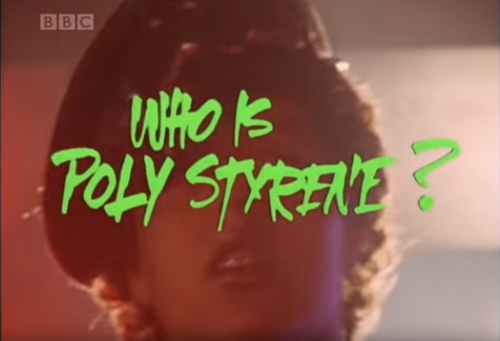‘Rock stars are disposable products, and I just wanted to send the whole thing up.’ So said Marianne Elliott, better known as punk singer Poly Styrene. In 1977 the twenty-year-old from Bromley gave up working in Woolworths and created her own plastic image. Forming the band, X-Ray Spex, she set about reflecting life in the synthetic 1970s with songs like ‘The Day the World Turned Day-Glo' and ' Germ-Free Adolescents'. This gritty Arena film from the BBC archives observes the differing worlds of Marianne Elliott and Poly Styrene — which were united via this remarkable woman’s willingness to laugh at and expose the throwaway culture of the time.
South London’s 198 Contemporary Arts and Learning – which hosted the first exhibition of Poly Styrene’s archives in 2019 – screened Arena’s Who is Poly Styrene?, directed by Ted Clisby. Commenting on this rare 1970s portrait of a mixed-race woman are, you can still watch filmmaker and daughter of Poly Styrene Celeste Bell, 2Tone vocalist and DJ Rhoda Dakar, Booker Prize winning author Bernardine Evaristo and feminist activist Chardine Taylor-Stone. You can also still enjoy new poems inspired by the film from two of the feistiest women in poetry, Zena Edwards and Salena Godden, and learn how to start your own personal writing journey with a masterclass from Irish author Geraldine Quigley.

WHO IS POLY STYRENE?
Director: Ted Clisby; Film Editor: Robert Hargreaves; Series Producer: Anthony Wall (1979)
Poly Styrene was the perfect punk, from her Oxfam Shop wardrobe to her choice of name — a ‘lightweight, disposable product’ of no particular value. She had a preoccupation with the everyday imagery of adverts, brand names and logos, the banal visual tapestry of modern life: ‘I pulled my nylon curtains back as far as they would go and watched the world turn day-glo…’. She was something of a punk Warhol but with a phantasmagorical vision uniquely her own.
Behind the pogoing, the safety pins and the couldn’t give a monkey’s attitude, punk was fundamentally satirical. By definition it had a limited life, it was consciously built not to last. Its purpose seemed to be to strike a match to demonstrate that there was no oxygen in the atmosphere. Purists will argue that it all came to an end when The Sex Pistols broke up in 1978. Poly’s punk career pretty much fits that trajectory.
She played her raucous part in punk. Director Ted Clisby captured that, but went further and revealed the fascinating, sensitive young woman behind the punk persona. Forty years on, the film remains one of the highlights of the Arena archive and an invaluable record of both Poly and the time. It’s safe to say that punk was utterly despised in all quarters but its own. I was the rock critic for The Morning Star from 1974 to 1978, a period bisected by the arrival of punk, I wrote this piece in March 1977:
‘They want to associate us with violence. It’s the only way they can slag us off. It makes us out to be just crude, ignorant and loutish. Which means we aren’t a threat to them.’ Johnny Rotten, lead singer with The Sex Pistols, talking to Caroline Coon in the Melody Maker. The interview was published before the celebrated encounter with Bill Grundy on Thames TV’s Today but Rotten’s words supply an apt commentary on the incident.
Who would have thought rock could still shock on such a grand scale? All the reports homed in on ears and noses adorned with safety pins, punk hatred, especially their hatred of older bands such as The Stones, obscene behaviour, The Sex Pistols’ musical incompetence and so on. The more interesting and significant issues were tucked away — the fact that this is a group that has come from the dole queue, claiming to draw its inspiration from the conditions that put them there.
Most reports insisted that Anarchy In The UK was rubbish. Technically the playing is simple, which only makes it similar to plenty of records that make the radio playlists but the energy of the delivery and the attitude behind the lyrics make it very different.
So far at least, punk rock is not a mass phenomenon — for one thing the fashions that go with it are too bizarre for most young people but several bands have adopted a ‘political’ stance.
They use their songs to protest against the frustrations and conditions that afflict working class youth and they do it with a specific reference that is new. White Riot, a song by The Clash refers to the disturbances at last year’s Notting Hill Carnival. It’s not racially motivated, it’s an exasperated demand for a white riot to react against the situation in which ‘All the power is in the hands/of those rich enough to buy it’.
Honesty is valued above musical complexity and the style need only be simple, which makes it easy to form a group — shades of the skiffle era. Moreover, punk bands say they hate the hype and the glamour with which rock is saturated. So, if they’re successful, won’t they begin to contribute to the same syndrome? How will they keep in contact with their fans? Won’t they become cut off from the conditions that make their music? What happens when they get older? Will it last? Should it last?
There are plenty of obvious criticisms but they can’t be expected to cut any ice with the punks, any more than jokes about protest singers with Rolls Royces used to impress Bob Dylan fans. The validity of such jibes was less important than the fact that the protests were being made — and received, on an unprecedented scale.
Punk may have burned briefly, but its impact on art, culture and even politics has been massive. Some of its pioneers, The Clash, Paul Weller, have gone on to have great careers; others were like shooting stars, they shone brightly and were gone. Like the Pistols, as a punk, Poly was one of those and, like The Pistols, she was the very epitome of punk.
Anthony Wall
15 November 2020
16 August 2020
YOUR LOCAL ARENA: RESPONDING TO Who is Poly Styrene?
Watch acclaimed author and professor Bernardine Evaristo, filmmaker and educator Celeste Bell, campaigner and Bodysnatchers vocalist Rhoda Dakar and Chardine Taylor-Stone, activist and musician, respond to the Arena film.
Responding to the film
INSPIRED BY ARENA’S Who is Poly Styrene?:
New Poetry by Zena Edwards and Salena Godden
Listen to and read specially commissioned poems inspired by the Who is Poly Styrene film from poets Zena Edwards and Salena Godden — who bring their links to south London and memories of Poly Styrene and the punk era into their new work.
Commissioned Poets
WRITING YOUR MEMOIR: A Masterclass from Geraldine Quigley
Taking Arena’s Who is Poly Styrene? as a starting point, explore how you can begin to craft your own memoir or life writing with author of the evocative novel Music Love Drugs War, Geraldine Quigley.
Interviews
Lucy Hannah with Anthony Wall
Lucy Hannah with Lucy Davies
Lucy Hannah with Mattie Loyce
Special Feature
For this last Your Local Arena of 2020, we're delighted to team up with London by Lockdown: a travel podcast, which explores the history of punk and women through the words of Poly Styrene, contemporary singer from the time Rhoda Dakar, and Poly's daughter Celeste Bell.









+pic+.jpg)

